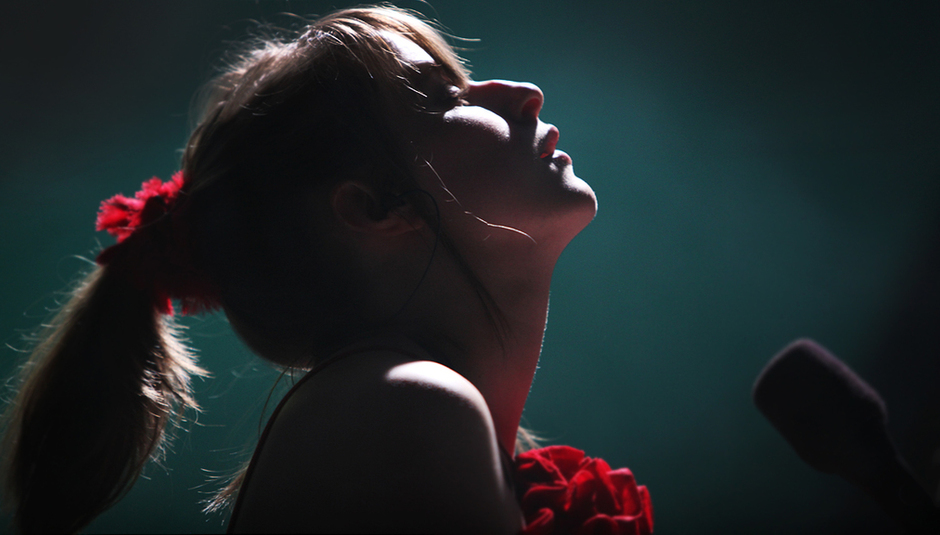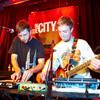We have to admit that Susanne Sundfør wasn't on our radar before this year's Great Escape. Having seen the queue for Wild Beasts and summarised that there was no chance of getting in, we decided to pop across the road to catch the Norwegian songwriter, playing a solo set at the Unitarian Chapel. What we saw and heard a) made us revel in the haunting, reverberating nature of the music and lyrics and b) want more.
She released her first, self-titled, album in 2007 aged 21, before re-recording, re-releasing it and renaming it I Resign the following year. As well as releasing her new album, The Brothel, earlier this year, in August Sundfør - along with Casiokids, Moddi and Shining - was awarded one of four a-ha talent grants which equated to around £100,000 and a support slot for the legendary Norwegian trio's farewell tour. Not bad at all.
So, when we found out that Susanne was to play Oslo's Øya festival in August, we were looking forward to indulging once more. We also thought it'd be good to get to know the artist a bit more, and planned an interview during the hectically scheduled festival. Which is this thing you're hopefully about to read...We caught with one of Norway's best and most promising musical hopes for the next decade. In a tent. With some very noisy band (possibly 1349) playing in the background.
DiS: So, to kick things off at the beginning - when did you start writing songs?
Susanne Sundfør: I started writing when I was 17 and I think I played for an audience for the first time when I was 18, so I started pretty late. I actually wrote my first song when I was 10 and I presented it to my piano teacher and she said “you shouldn't do that”.
DiS: You went on and proved her wrong, pretty comprehensively, then...
SS: Yep!
DiS: How would you say the new record differs from the first, given that first one was re-recorded and re-released just as a solo artist...
SS: It's very different. The first album I just recorded the songs that I was most satisfied with, that I'd made. There wasn't this conceptual wholeness or concept above it, it was just like “these are the best songs and we're going to release it”. This album I've worked much more to make the songs suit each other and complement one another. Also, of course, the production is very different and the arrangements, too. I've worked with a very talented producer and musician on this record, Lars Horntveth from Jaga Jazzist. He's really contributed a lot to the sound, he made a lot of the arrangements and plays a lot of the instruments on the album, so it's highly influenced by him.
DiS: So this one is completely deliberate in going about doing it?
SS: Yeah, I had a plan and then I made the songs to suit the plan.
DiS: You said about an overlying concept, what is that?
SS: The theme that binds them all together is The Brothel, which is the name of the record. I guess there are other things to say about it. It's a lot about domination, and how people connect to each other and hierarchies in society. People...and how you relate to dominance and power or whatever - how that makes you feel, weak or strong.
DiS: What did you learn from making the first record that made you do things differently for The Brothel?
SS: I think I've learned to be much more involved in the process. I didn't have that much confidence on the first record, whereas on this album I've really tried to and wanted to be involved in as many of the processes as possible, and also to make arrangements. I didn't arrange the songs on the first album, I just wrote them on the piano and that's it, but here I made some of the string arrangements.
DiS: How much performing do you do with a full band and how much solo, just on your own?
SS: I used to do a lot of solo gigs before, but I'm kind of tired of it, I just want to play with the band. And also the last album...I don't think that it's enough to just play solo because of all the arrangements and because of the sound on it...
DiS: Yeah...a lot of it is quite intricately put together and arranged...and for songs like 'The Brothel', maybe there would be something missing to play the full version without the full backing?
SS: Yeah, exactly.
DiS: The sound here [at Øya] is actually fairly astonishing for a festival, that must help things - in the UK it's often a major problem at festivals...
SS: They're very thorough with everything here. I guess British sound has had a bad reputation, though.
DiS: Did you have much of a musical upbringing?
SS: I didn't have...nobody in my family played an instrument, but they were very interested in music – there had always been a lot of talk about music and literature in my home. I took piano lessons and singing lessons...
DiS: Is literature something that inspires you to write as well?
SS: Definitely. It is.
DiS: What sort of literature inspires your music?
SS: I guess it's very...I'm not that good at reading contemporary literature, I like to read the classics. It's very interesting to have that tapestry when you write and to have that baggage in a way, and then perhaps read some contemporary literature. Your understanding works better when you have the history, the canon.
DiS: I think it's nice to look at and from a specific time period, stuff that's hundreds of years old, and to look at it through the context at the time, and then how it frames what is happening in the present, and how it relates to that...
SS: Yeah, absolutely.
DiS: If we could talk about the a-ha talent grant - what was the process for it?
SS: There was a jury and a-ha were part of it, but they also had other people on it, I don't know who they were...some music business people. They decided amongst themselves who was going to be nominated. I think the jury decided who was going to be the eight finalists and then the audience decided the last four.
DiS: How did you feel when you announced you as the winner?
SS: I felt great, of course! But I didn't really know what to think because the concerts and contests were arranged in VG-lista which is a show for young people and I didn't know if my audience were so young necessarily. The guys I competed with [Pink Robots] were more appealing to a younger audience, so I wasn't sure if I was going to win or not. Of course, they are really great musicians as well and make great music. I was very surprised and it was a great moment, not just because of the money but because it can do a lot for my career, and I really want to make it outside Norway and spread my wings outside of Norway, which is kind of hard for Norwegian artists.
DiS: Do you think it's come out at the best possible time for you now? Being able to fund tours and whatnot?
SS: Yeah, and that's what I want to do.
DiS: How much have you played outside of Norway?
SS: I've done mostly showcases at music business festivals like The Great Escape, Popkomm and Spot Festival in Denmark. I guess that's it, I haven't done that much. I've done some concerts in Denmark and Sweden but mostly in Norway. I hope that can change. I mean, I love playing in Norway, but I'd really like to play outside of Norway as well and do tours and release my album in Europe and the rest of the world.
DiS: Do you think you'll do a big European tour or do a stage at a time?
SS: I think I have to plan it and be strategic about it. So I don't know what the smart thing to do is, but I want to make a plan where me and my band can play as much as possible. So if that's for me to tour the whole of Europe at once, or it means that we concentrate on one country then another country then it doesn't really matter, just to be sure to do the right thing.
DiS: What do you think of the other artists who won the a-ha talent grant? They're all quite different...
SS: Yeah, sure. I know most of the people and they are great people and they work hard, all of them. Casiokids are an amazing live band...have you seen them live?
DiS: Yeah, twice, both in Norway. So much fun. It's like it's a contest between the crowd and the band as to who will have the most fun.
SS: And they do have fun, that's for sure. And Moddi, I think he's really got a sound and found out what he wants to do with his music and where he wants to be, genre and sound-wise. I saw him at the fesitval in the north of Norway, which was an amazing concert. And I love that Icelandic thing he does...like Sigur Ros. Shining are amazing, too, and such talented musicians. I guess I know Jørgen a bit, but they are amazing.
DiS: Have you heard their new record, Blackjazz?
SS: No, but I've got Grindstone, which is amazing – I love that operatic thing they do.
DiS: Yeah, it's a bit heavier and more intense than Grindstone. Do you think the other acts who won the other regional finals are a good representation of Norwegian music at the moment?
SS: Yes, absolutely. I think Shining represent Norwegian music really well, for the jazz scene and also for metal – which is perhaps the most famous genre of Norwegian music abroad. And Casiokids are very representative of the Bergen scene and just the west coast of Norway in general. There's a lot of bands who do that kind-of indie-cowbell thing! Moddi also...there's a lot of great music appearing in the north of Norway like Kråkesolv, who sing in Norwegian, and Adjagas. They all have their own genre and all of them are very different but represent the Norwegian music quite well.
DiS: And, talking about scenes and regions, where are you based at the moment? In Bergen...or?
SS: No I live in Oslo.
DiS: But you studied in Bergen, right?
SS: I did, for a little bit but that didn't go so well!
DiS: How long have you lived in Oslo for? And is the musical scene quite close?
SS: About a year. Yeah, everybody knows everybody else. I really like that it doesn't matter what kind of music you play – especially in Oslo – we all hang out together and I have a lot of friends in the music business as well as musicians. It's not like if you play rock you just hang out with rock people and that you don't want to hang around with jazz musicians.
DiS: Do you think you'll live in Oslo for much longer?
SS: No, I really want to travel abroad, perhaps outside of Norway.
DiS: What places would you most like to play and live?
SS: I'd like to play all over the world, but I think I'd like to live in America, the US. I haven't really decided yet, but it'd be fun to get outside for a while and I've lived here for my whole life. It'd be nice for a change.
DiS: As well as the support from things like the a-ha talent grant, the help that comes from the government must come in handy, too. How important is it for emerging bands?
SS: I think that's essential for Norwegian niche music to be supported by the government because Norway is such a small country, we're only 5 million people and it's not like if you play in Germany where there are 70+ million people, there's a much bigger chance that you can make a living playing strange music. But in Norway there's such a small market that you have to be supported to make it.
DiS: I read somewhere that you lived in England for a while, is that right?
SS: Actually that's not correct. I tried to live there but it was too expensive. It was after the first album and I was tired of the whole business and I didn't feel like I was playing the music I wanted to perform.
DiS: Was that when you took the decision to bring in a band?
SS: No, I had a band then but I wanted a new sound, I was just really tired of it all.
DiS: But it sounds like you've found that now, and that as a result you're a lot happier playing what you do now...
SS: Yeah, because I feel more at home with the sound and that is simply because, when I released the first album I was playing songs I released three years ago – I was 21 when the album came out and most of the songs I wrote when I was 18.
DiS: Moving back to the issue of Norwegian talent making it outside of Norway, do you think festivals like this help raise the profile of Norwegian bands...
SS: If there are a lot of international delegates then of course it's a good thing for the scene, spreading the word.
DiS: It also seems to be that the whole way festivals are conducted seems to be so well organised...
SS: It's very strict where you can go and how much you can drink, especially if you're an artist etc. They're very strict in Norway with festivals and alcohol.
DiS: What are your plans for the next few months?
SS: I think we're trying to book some gigs outside Norway, but I do have four or five more Norwegian festivals and then I think I'm going to start on the next album.
DiS: Who are the other Norwegian artists on the bill who you'd recommend?
SS: Erm, John Olav Nilsen og Gjengen, Casiokids, I Was A King...I'm so bad at remembering things! Hypertext is great...I'm in that band.
DiS: Ah yes, you said! A lot of people have been talking about Cold Mailman, what are they like, I've not heard them...they were supporting Hypertext last night, right?
SS: They played before us at Gamla last night, but to be honest I don't really like to go to concerts before I play myself because I get so distracted that I can't focus, so I didn't get to see them, but they sound good.
DiS: What do you play with Hypertext? Singing, keyboards?:
SS: Well I sing and try to play chaos pad, and a sampler and a drum machine but I think I have to practice a bit more!
DiS: An intriguing mixture. What does it all come out sounding like?
SS: It's a mixture of kindergarten toys and blues rock...
DiS: And a lot of fun to play live?
SS: It is.
DiS: It must be nice to have the variety of doing something like that and then coming to play here on the big stage?
SS: Yeah, absolutely. It's very different to play with Hypertext because it's just a different sound. I love playing with other people because I've done so much solo work now that it's great to share the stage with other musicians.
DiS: What have you got coming up with Hypertext then?
SS: We've recorded an album, we did that this winter and we're planning on releasing that this Autumn.
DiS: So very busy then...which is a good thing?
SS: Of course! It's so much better when there is a lot of things happening, you can really feel like you're working and doing something. To be a musician there's a lot of ups and downs, because it's not a 9-5 job, so one year you only write and it's very quiet and then it's like BOOM, everything is happening, like a rollercoaster. It's not hard, it's just weird, a little bit of a headfuck in a way.
DiS: It's good to be satisfied, which you seem to be at the moment...
SS: I feel privileged to work with the musicians that I work with now. Øystein and Gard, the keyboardist and the drummer in my band, play in this really great jazz band called Puma who you really should check out. Then Lars Horntveth does Jaga and solo stuff, too.
DiS: When I saw you at the Great Escape and you were playing on your own you didn't really stop in between songs and just kept going. It was impressive, felt totally complete. Do you always do this?
SS: Yeah, I usually prefer to not stop between the songs so it's a long concert. When I do solo things I see myself as a classic musician, I see it as that kind of a setting where you play a long piece and then you stop.
DiS: Is there anyone in particular that you'd like to work with in the future?
SS: I really like working with the people I'm working with now!
Main photo by NRK P3
For more on our Nordic Music Series click here.






















